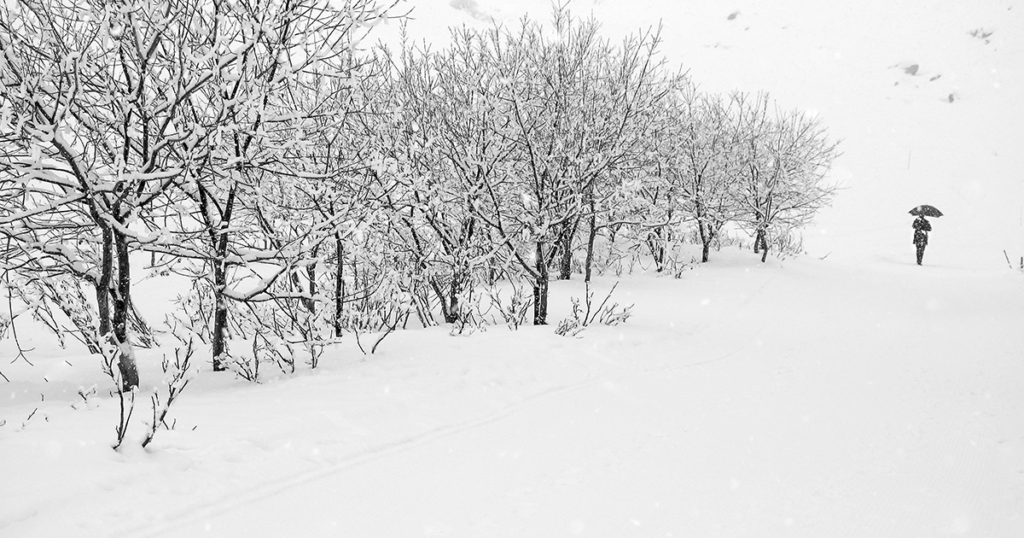
It was 73 degrees in Washington on Tuesday afternoon. Yesterday, the temperature inched even higher, leading me to wonder if this jarring shot of spring into the gut of late February might once again agitate the cherry trees into a quivering, premature bloom. Walking to work the other day, I overheard two women admitting to the guilty pleasure of savoring this warmth while fully acknowledging how wrong it felt. I, however, take no delight at all in the weather. I happen to love winter and everything that used to come with it: the snow, the bracing cold, warm sweaters, neat whiskey. And so, in a little act of defiance, I went home last night and put on Jorge Bolet’s recording of Liszt’s Transcendental Etudes, namely the last etude in the set of 12—Chasse-neige. I closed my eyes and dreamed of snow.
Liszt published his Études d’exécution transcendante in 1852, having worked on them in some form for more than two decades. These virtuosic works, some of the most difficult in the piano literature, are also expressions of the highest poetry, many of them bearing descriptive, narrative titles. The fifth etude depicts the will-o’-the-wisp, the eighth a wild hunt as evocative as Weber’s Der Freischütz—one can almost hear the horns summoning the hunters into the forest depths. Ferrucio Busoni, an outstanding early interpreters of the etudes, called Chasse-neige “the noblest example, perhaps, amongst all music of a poetising nature—[of] a sublime and steady fall of snow which gradually buries landscape and people.” Indeed, if there is a more visceral musical depiction of whirling snow and bone-chilling winds, I have yet to hear it.
The technique that Liszt uses to conjure up this magic is the tremolando, that is, the rapid alternation between notes that produces a trembling effect. From the first phrase, you hear these chilling tremolandi as they underpin a simple, plangent melody in B flat minor, and they continue throughout the piece, as Liszt’s musical blizzard grows in force. With the snow swirling in earnest, the chromatic harmonies increase the sense of loneliness and distress, the pealing of great sonorous chords making the soundscape all the more intense. How expressive is this beautiful vision: the snow falling with such insistence to blanket a windswept plain, and then, a rumbling of thunder in the low bass—it’s as if this snowstorm were being summoned up by the gods themselves from the belly of the earth. The melody becomes almost intolerable, so heartbreaking is it, so saturated with melancholy, and by the end, when the storm dies away and the keening winds dissipate and the tremolandi become a mere whispered agitation, there is little sense of consolation. The final notes of this superb piece of naturalistic tone painting amount to an anguished cry, calling to mind the call of a despairing soul lost amid a blinding whiteout. That a highly virtuosic and gregarious set of pieces should finish on this somber note is telling, I think: it gives me a distinct chill every time I hear it. Many pianists have set down impeccable versions of the Transcendental Etudes, Claudio Arrau, among them, though I have a special fondness for Bolet, the Cuban-born artist with the cultured touch, a cantabile tone, and an unimpeachable technique.
I should say that it did snow here last Saturday, and somewhat intensely, at that—a lovely sight to behold for several hours. By Sunday, all of it was gone, our lawn a sodden, muddy mess. So I’ll continue to seek my solace in music for the foreseeable future. Let others rejoice in this unseasonable warm spell. I’ll turn instead to Schubert’s Winterreise, or the Sinfonia antartica of Vaughn Williams, or perhaps the icy sound worlds of Sibelius.
Listen to Jorge Bolet play Chasse-neige, in this classic recording from 1985:


